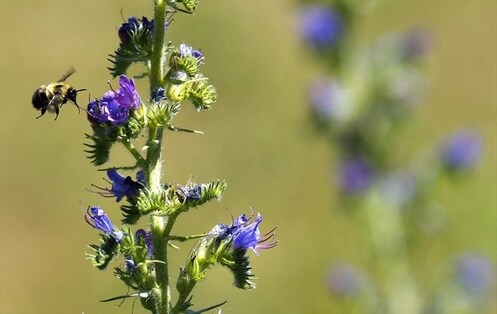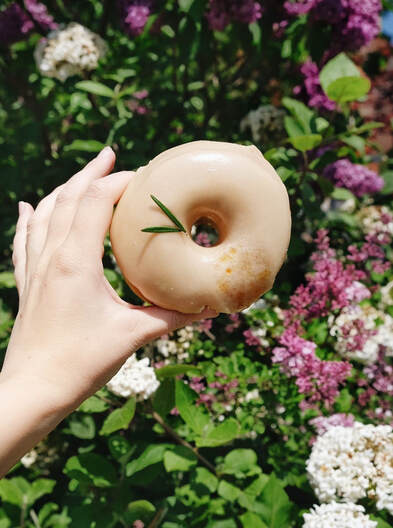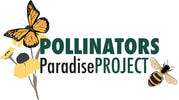 Published in thespec.com, June 11 2019 So you want to help save the bees? That's great, but first of all, you'll need to get to know your bees. From a conservation perspective, it's the wild bees as opposed to managed bees that we need to be focusing on. As plant pollinators, they are the ones that do most of the heavy lifting, yet they get the least attention. Dr. Sheila Colla, a conservation biologist at York University, states many people believe honeybees are wild bees. They are not. Honeybees are for honey production and pollination of some crops, they are not even native to North America. Sheila decries the lack of knowledge about native bees of which Ontario has over 350 species, most of them ground nesters, saying, "even the most avid naturalist groups don't know about the diversity of our wild bees." Why the confusion about the kinds of bees in need of our help? Many people became more concerned when beekeepers called for support to fight neonicotinoids (insecticides), "but they made it seem like this was the biggest threat, when in fact it is one of many," Sheila says. According to Sheila, pathogens from managed bees and diseases spillover are the biggest threat to wild bumblebees, the wild bees which are the best studied. "Disease tends to increase because we manage bees in densities higher than they would be found in nature." As an example, Sheila points to the bat population that contracted 'white nose syndrome.' "Over 90 per cent were impacted because when an animal is introduced to a disease they were never exposed to before, it can be catastrophic." Sheila argues that planting good quality habitat that provides both spring and fall flowers is one of the most significant things we can do. We need to beware of misconceptions — even the bee condo, while useful for education purposes is not so innocent a conservation tool. Research by Scott MacIvor's lab shows that bee condos are more parasitized, and fungus issues occur frequently. For Sheila, "it comes down to a western way of thinking that we can manage the environment and make it work the way we want to. This highlights to me it's one knowledge system we are still applying."
0 Comments
 Rosemary Maple Brûlé Rosemary Maple Brûlé For Immediate Release June 4, 2019 Hamilton Pollinator Paradise Project & Donut Monster: Pollinator Awareness Campaign Celebrating & Raising Awareness About Pollinators Throughout June Pollinators are a sweet deal! That's why the Pollinator Paradise Project is partnering with Donut Monster throughout June to raise awareness about the vital work these little critters do. By pollinating wild plants and food crops, they help provide one out of every three bites of the food we eat. To this end, Donut Monster’s “Pollinator Donut”--a Rosemary Maple Brûlé--delivers a tasty bite with a very serious message. “Pollinator populations are rapidly declining due to factors such as habitat loss, pesticide use, and climate change,” says Project Manager, Jen Baker. “In fact, the recent UN global biodiversity assessment estimated that about 1 in 10 insect species are threatened with extinction.” The loss of pollinators (and biodiversity in general) means serious negative impacts on the health of our ecosystems. “We’re excited about creating the Maple Rosemary Brûlée donut to bring awareness to the Hamilton Pollinator Paradise Project,” say owners Heidi and Reuben Vanderkwaak. “It is a very tangible way for the community to get involved. The donut has an amazing flavour and we really hope that highlighting this project will cause our customers to stop and consider how they can find simple ways to improve biodiversity in Hamilton.” Many ways to Help. Many ways to Celebrate. The Hamilton Pollinator Paradise Project is planting a paradise for pollinators across Hamilton by creating habitat with native trees, shrubs, and wildflowers. Because the need to raise awareness about the plight of pollinators is so urgent, the project is taking National Pollinator Week (June 17-June 23) and making a Pollinator Month of it! HERE'S WHAT YOU CAN DO:
Supporting pollinators is a win-win-win for everyone--pollinators, plants, and people! Learn more about the project: https://www.hamiltonpollinatorparadise.org/ For more information or to arrange an interview, contact: Beatrice Ekoko, Communications Manager at [email protected] or call 905 549 0900. |
Archives
December 2023
Categories |
|
|
Butterflyway Hamilton: www.facebook.com/butterflywayhamilton/
Environment Hamilton: https://www.environmenthamilton.org/ Hamilton Naturalists' Club: https://hamiltonnature.org/ |

 RSS Feed
RSS Feed